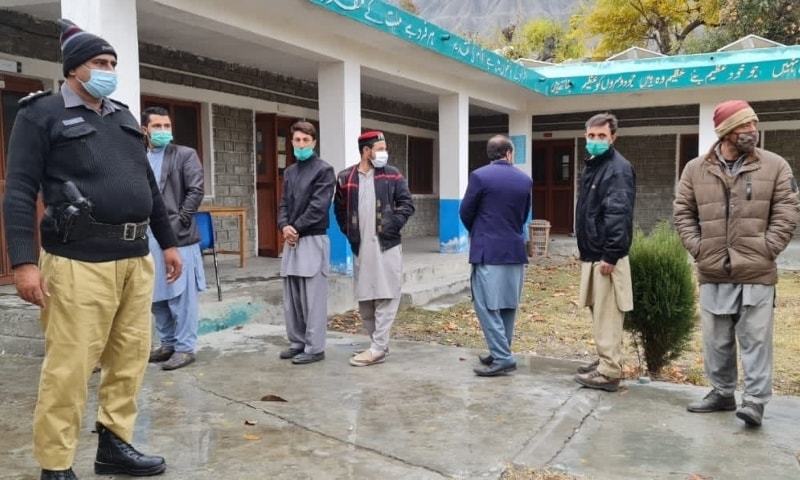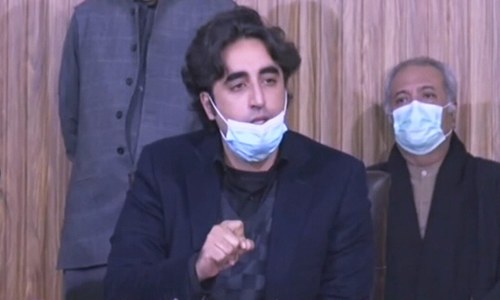ISLAMABAD: Observers deployed by the Free and Fair Election Network (Fafen) have reported an average of three illegalities or irregularities per polling station during elections in Gilgit-Baltistan (GB).
According to a preliminary report on the elections released by Fafen, the irregularities observed included breach of secrecy of the vote, stamping of ballots by others on behalf of voters, and the failure of registered voters, who did have national identity cars, to cast their ballots due to various reasons.
Such issues could have been avoided with more diligent enforcement of rules by the GB’s election commission, Fafen said.
Also, instances of allocation of more than the legally prescribed number of voters per polling booth led to over-crowding and disorder at some polling stations.
Similarly, the election commission did not ensure the provision of Form 45 (the Result of the Count) and Form 46 (the Ballot Paper Account) to all polling agents present at the polling stations during the vote-counting process, which would have helped enhance the integrity of the results management process.
In many cases presiding officers had to issue the polling stations’ results to polling agents on plain paper under their stamps and signatures, the legality of which has yet to be established
The problem was largely due to a lack of availability of sufficient numbers of forms at the polling stations.
Resultantly, the presiding officers had to issue the polling stations’ results to polling agents on plain paper under their stamps and signatures, the legality of which has yet to be established.
The voting and counting processes were mostly transparent, however, with Fafen observers reporting the presence of polling agents of major political parties and independent candidates in most polling stations.
However, instances of polling agents seated at a place from where they could not observe the voting process clearly were reported from six constituencies.
More serious were reports that candidates and their agents were barred from the returning officers’ offices during the preparation of preliminary results in at least three constituencies, and delay in the release of provisional results on Form-47 (Provisional Consolidated Statement of Results of the Count) in more than 10 constituencies.
These problems shaped the political discourse on an otherwise orderly and peaceful electoral exercise conducted according to the law, which requires finalisation of provisional results by 2am on the day following the polling.
These issues allowed major political contenders to question the credibility of the outcome and to raise allegations of electoral fraud. Many of these issues, however, could have been addressed by the chief election commissioner using his clearly defined powers under Sections 4(3)2, 8(b)3, 9(1)4 and 95(6)5 of the Elections Act, 2017 in order to enhance the confidence of electoral contenders in the integrity of the process.
Opening of polls
The election day remained generally peaceful and orderly, with voting continuing uninterrupted from 8am to 5pm, as designated by the election commission. Most of the polling stations were open for casting of ballots at the assigned hour, with a few exceptions reported from Astore, Ghizer and Ghanche, where weather conditions and administrative hurdles delayed the opening of polling stations on time.
Fafen observers reported exchange of harsh words between voters of contesting parties and candidates at 43 polling stations (9.9 per cent) in 14 constituencies.
Incidents of minor violence inside polling stations, involving candidates, polling agents, political workers and polling staff, were observed in almost half of the constituencies (47.8pc). These incidents happened mainly because of entry into the polling stations by unauthorised persons who were resisted by the polling staff.
Minor incidents of violence between contesting parties and supporters of independent candidates were observed outside 10 polling stations in eight constituencies. No injuries or fatalities were reported from the observed polling stations.
The security staff deputed at the entry points of polling stations generally behaved with voters in a polite manner at most polling stations (91.5pc) in all constituencies. Security officials were observed to be unnecessarily harsh at four polling stations in three constituencies, however.
Campaigning on polling day
Fafen observers reported that the commission generally managed to curtail campaigning and canvassing inside and outside polling stations on election day. In more than half of the observed polling stations (59.2pc) in all constituencies, the observers did not report any camps of parties or independent candidates.
However, camps were found within the prohibited limit of one-third of the polling stations (30pc) in 18 constituencies. A majority of the observed polling stations (83.3pc) in all constituencies did not have any campaign materials within their perimeter.
However, the polling and security staff at 31 polling stations (7.1pc) in 10 constituencies did not remove such materials from polling station buildings. Fafen observers reported from more than three-quarters of the polling stations (79.4pc) in all constituencies that there was no campaigning or canvassing inside the stations.
However, this problem was observed in 49 polling stations (11.2pc) in 13 constituencies.
Fafen reported a competitive and mostly peaceful campaign by political parties and independent candidates.
However, violations of the code of conduct by political parties and candidates were also observed as oversized publicity materials were used, and federal ministers and public office-holders participated in canvassing.
The observers noted the use of oversized publicity materials in 100 instances, followed by 31 oversized posters, 25 banners, 12 portraits, and illegal use of wall chalking in four cases.
In six cases, political parties and candidates used government buildings to affix campaign materials — by the PPP and PML-N (two cases each), and Islami Tehreek-i-Pakistan and an independent candidate (one each.)
Published in Dawn, November 19th, 2020














































